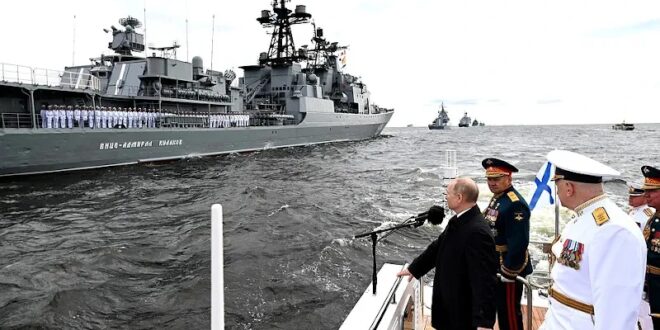Russia’s recent military operations against Ukraine have expanded its control over critical Sea Lanes of Communication (SLOC) in the Black Sea. SLOC give the region international economic importance by forming a conduit for trade between Europe, the Greater Middle East, and the Russian Federation.
In addition to facilitating transshipments, Black Sea littoral countries are major contributors to the global supply chains of several important commodities, including metals, hydrocarbons, and food. While the long-term status of territories and assets seized by Russia following its invasion on February 24th remains ambiguous, if left under Russian control they could considerably bolster Russia’s geopolitical position.
Russia’s Economic Interest in the Black Sea
The Black Sea already has significant economic importance for Russia, especially in regards to grain and hydrocarbon exports. Russia relies heavily on its Black Sea deep water ports to transport grain, 90 percent of which it exports through the maritime domain. Major Black Sea terminals in Novorossiysk, Tuapse, and Taman allow Russia to retain its position as one of the world’s leading grain exporters. Russia has continued to invest in Black Sea export capacity over recent years. The inauguration of a new deep-water berth at Novorossiysk in July 2021 has upgraded the grain terminal carrying capacity from 50,000 tons to 7 million tons per year, the second largest transhipment volume in Russia.
The Black Sea also plays a major role in the exportation of Russian hydrocarbons to markets in Europe. The majority of hydrocarbons transit the Black sea as gas through two underwater pipelines, BlueStream and TurkStream, which are responsible for a combined 30 billion cubic meters of gas annually. Hydrocarbons are also transported by tankers across the sea as refined and crude petroleum. The CPC terminal near Novorossiysk shipped roughly 60.7 million tons of oil across the Black Sea in 2021. Direct control over the SLOC in the Black Sea allows Russia to protect and expand on its economic interests.
Russian Black Sea Operations
By seizing Ukrainian ports along the coastline and controlling access to shipping lanes, Russia stands to make tangible gains from its invasion of Ukraine. Russia has already occupied several important Ukrainian ports along the Black Sea and Sea of Azov and continues to advance down the Ukrainian coastline. According to statements made by Russia’s high command, the occupation of the entire Ukrainian coastline remains a strategic objective. Combined, the cargo capacity of Ukraine’s 13 ports hovers around 230 million tons per year. Ukraine’s reliance on these ports has grown exponentially over recent decades. From 2013 to 2019, the amount of commodities exported through seaports increased by 85 percent. By controlling Ukraine’s access to the sea, Russia is greatly enhancing its own export capacity while delivering a crippling blow to Ukraine’s economy.
Russia has also expanded its influence over SLOC through its occupation of Snake Island. Despite its acquisition through illegal annexation, Russia could lay claim to the island’s maritime zones. According to the United Nations Convention on the Law of the Sea, islands give sovereign nations jurisdiction over a territorial sea that extends 12-nautical miles from the shoreline. The key shipping lanes connecting the major Ukrainian ports of Odesa, Mykplaiv, and Kherson to international markets pass through or near Snake Island’s territorial waters. Although foreign ships are normally entitled to innocent passage, countries can still regulate the movement of foreign vessels. Russia’s unilateral decision to cut off traffic through the Kerch Strait and along Russian occupied coastlines in the recent past demonstrates its willingness to enforce economic blockades.
Changing the Status Quo
In terms of geopolitical leverage, Russia’s military operations enhance Putin’s ability to place pressure on local and regional economies. Snake Island’s close proximity to the Danube Delta also means the island is strategically located to potentially regulate trade along the Danube River, which functions as a major transport corridor for the European Union. Altogether, by occupying coastal or island territory near the Danube, Volga, Dnipro, and Dnister deltas, Russia can threaten the major rivers transporting commerce into the Black Sea. Only the Turkish Straits, controlled by Turkey via the Montreux Convention, would offer an alternative waterway for maritime transport attempting to access harbors in the Black Sea.
Russia’s maritime operations also directly impact international markets. In the short-term, the invasion of Ukraine continues to affect the prices of high-demand commodities produced in the Black Sea region, including grain, coal, iron, steel, aluminum, neon, platinum, and nickel. Plans by Russia to compile a list of export bans in retaliation to Western sanctions can further exacerbate strain on the global economy moving forward. In the long-term, Russian occupation of Ukrainian coastal territories along the Sea of Azov and the Black Sea would give Putin control over major production centers for commodities like steel and iron. Although the permanent occupation of Ukrainian territory would require a significant amount of funds to rebuild and hold, the coastal areas could potentially become an asset to the Russian economy in the future.
Conclusion
Russia is consolidating its control over major SLOC, seaports, and coastal territories around the Black Sea. Occupying the associated maritime access points and production centers allows Russia to expand its influence over regional markets. Although Ukraine is actively defending its territory, Russia continues to make incremental gains along the coastline. If permanent, the territorial losses would not only significantly impact the Ukrainian economy, but also threaten the security of major global supply chains.
 Eurasia Press & News
Eurasia Press & News



